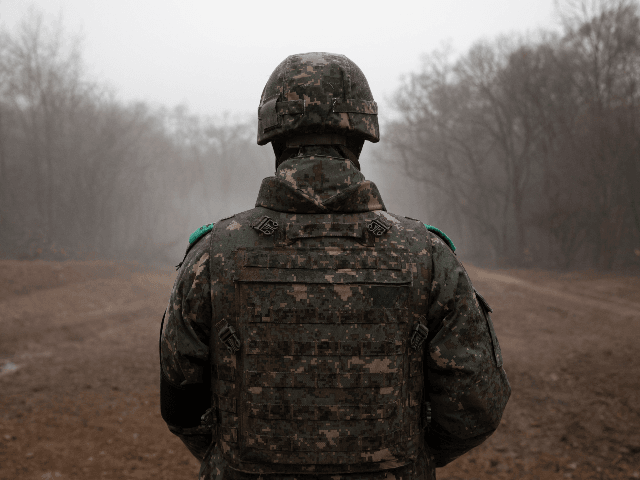A South Korean soldier committed suicide, officials confirmed Tuesday, less than a month after his unit failed to detect a North Korean ship navigating territorial waters, leaving a suicide note berating himself for his incompetence.
Seoul did not identify the man, save for stating that he was 21 years old, a private first class, and in the unit that would have been responsible for detecting a border breach when a North Korean fishing vessel floated into South Korean waters last month carrying four people. The incident triggered widespread outrage in South Korea, both for the flagrant manner that the North Koreans appeared to illegally cross the maritime border and the government’s secrecy in addressing the incident.
According to the South Korean news service Yonhap, the late soldier jumped off a bridge over the Han River and survived the fall long enough to be taken to a local hospital, but died shortly after arriving. He had begun a leave of absence from the military and left a suicide note where he criticized his own alleged incompetence in the military and admitted that he had “difficulties in adapting to military life away from his parents.”
While he was a member of the unit patrolling the area where the North Korean ship was found, he was not personally under any investigation for having played a role in the security breach. Authorities did note, however, that the man “had been rebuked by a senior officer since April for his poor handling of his duties.” Military officials told the media that they would continue to investigate his death and any potential role he may have had in the North Korean boat incident.
The boat in question entered South Korean waters near Samcheok in the East Sea in June, navigating for 57 hours before the military was alerted to the problem. According to reports from locals, the four crew members came to shore in South Korea after being in the country’s waters for three days, navigating almost 100 miles south of the maritime border before the military was aware of their presence. Upon landing, a civilian reported that one of the men approached them asking if he could use their mobile phone to call an aunt that lived in Seoul. Authorities had no evidence of the border breach until a civilian called an emergency hotline saying that North Koreans were ambling about a local beach, wearing “communist” suits and identify themselves as North Koreans.
Military authorities reportedly questioned the four men extensively about how they came to arrive in South Korea. Most of the details of those interrogations were kept secret. The government did reveal that two of the four men requested to defect to South Korea, while the government would be sending the other two back at their request. Seoul claimed that the men “drifted” into the country after their fishing vessel’s engine failed.
In late June, President Moon Jae-in announced a broader probe into South Korean military protocol to find where the security lapse occurred that allowed the men so much time in the country undetected, so much so that civilians had to contact soldiers and tell them that the North Koreans had crossed the border. Prime Minister Lee Nak-yon and Defense Minister Jeong Kyeong-doo both personally apologized.
South Korea has still not revealed the soldiers’ specific origins, identities, or any detailed information on how the breach occurred. The JoongAng Ilbo, a South Korean newspaper, published a column last month listing the many inconsistencies in the case that remain unaccounted for:
The defense ministry said the boat had been discovered “near the harbor,” and hid the fact it had been reported in detail by the coast guard two days earlier. The ministry claimed the coast guard could not detect the boat’s arrival because the waves were too high. A Blue House official was also present at the military briefing. All the circumstances raised suspicions that the authorities fabricated or tried to hide the truth on the orders of the Blue House.
The way the authorities dealt with the fishermen was even more bizarre. The government said that two of the four North Koreans onboard were returned to North Korea upon their wishes after two days of questioning. Another perplexing question is how the fishing boat was able to dock in the harbor without any conflict among the four fishermen if their opinions on what to do upon reaching the South were so very different. It is also rare for authorities to wrap up such a probe within two days. The behavior of the fishermen was also easy to question. They looked remarkably clean for having been at sea for days and casually asked a villager to use a mobile phone.
North Korea also has been strangely calm. It usually accuses Seoul of “kidnapping” if a North Korean fishing boat is seized, and demands the return of the entire crew. Some are already speculating that the boat could have been on a spy mission. The military is said to be disgruntled after being blamed for failed maritime reconnaissance.
“The incident is a comprehensive failure,” JoongAng Ilbo concluded.
North Korea has still, at press time, not publicly demanded the return of the two sailors who defected. Pyongyang typically accuses South Korea of “abducting” defectors and accuses them of human rights violations.
On Monday, South Korea’s defense ministry announced the deployment of “large and medium-sized warships” to the maritime border with North Korea, directly in response to the incident last month. The military also removed the officer in charge of the army corps responsible for patrolling the region where the incident occurred, presumably the one the soldier who committed suicide belonged to.

COMMENTS
Please let us know if you're having issues with commenting.